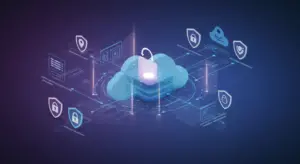Small businesses, the unsung heroes of commerce, find themselves at a critical juncture where innovation and vulnerability collide. The stark reality is that 62% of businesses have experienced the tangible aftermath of cyber security incidents, as reported by cyber.gov.au. In this era of rapid technological advancement, cybercriminals are constantly refining their tactics, highlighting the urgent need for small businesses to prioritise cyber security tips ranging from comprehensive employee training and restricted user access to the timely implementation of security patches and security software.
This is echoed by the resounding consensus of 80% of respondents, who rate cybersecurity as ‘important to very important’. Amid the journey of safeguarding your business, there’s a singular rule every small business owner must heed.
And what is the number 1 rule in cyber security?
The number 1 rule in cyber security is “Vigilance”. It entails being aware of potential risks, staying informed about the latest cybersecurity developments, and cultivating a proactive mindset.
Adhering to the foundational rule of cybersecurity is just the beginning. There’s a whole arsenal of essential security tips required to protect your small business. Dive into our blog to not only step confidently into the spotlight, but to seize the reins with powerful cyber security measures, turning the tide decidedly in your favour.
12 Essential Cybersecurity Tips for Small Businesses
- Use Strong and Unique Passwords
- Provide cybersecurity training to employees.
- Implement Multi-Factor Authentication (MFA)
- Keep Software Updated
- Conduct Regular Data Backups
- Secure Wi-Fi Networks
- Implement Firewalls and Antivirus Software
- Restrict User Access
- Regularly Monitor and Audit Systems
- Develop an Incident Response Plan
- Ensure the Security of Third Parties
- Use a Virtual Private Network (VPN)
Use Strong and Unique Passwords
Undoubtedly, the significance of employing unique passwords cannot be overstated, especially when considering the potential threats to business devices from cyber criminals. The practice of reusing passwords across multiple accounts poses a substantial risk that extends beyond individual compromise. In the event of one account being compromised, the domino effect puts all other accounts using the same password in jeopardy, potentially providing a gateway for cybercriminals to exploit sensitive information.
As a basic security measure, strong passwords should be complex, containing a combination of uppercase and lowercase letters, numbers, and special characters. Avoid using easily guessable information or common passwords. Ensure that each account has a distinct password to prevent a single breach from compromising multiple accounts.
Provide Cyber Security Training to Employees
Employees constitute the initial line of defence against cyber threats, and their awareness and knowledge play a pivotal role in addressing security flaws within the small business digital infrastructure. Cybersecurity threats often exploit human vulnerabilities, making it essential for employees to be well-informed and vigilant. Training sessions typically cover topics such as recognising phishing attempts, understanding the importance of strong password practices, and being cautious with sensitive information.
This not only reduces the likelihood of falling victim to cyber attacks but also fosters a culture of responsibility and awareness within the organisation. Regular training sessions can help employees stay abreast of evolving cyber security threats, ensuring they are well-equipped to play an active role in safeguarding sensitive data and the overall integrity of the business’s digital infrastructure.
Implement Multi-Factor Authentication (MFA)
Implementing Multi-Factor Authentication (MFA) is a crucial cyber security tip for small businesses designed to enhance the protection of digital accounts and systems. MFA adds another layer of security beyond just a password, requiring users to provide additional proof of identity. This typically involves a second form of authentication, such as a one-time code sent to a mobile device, a fingerprint scan, or a smart card.
The adoption of MFA is particularly impactful for ensuring the security of your business, as it significantly impedes unauthorised access even in cases where a password is compromised. The additional authentication factor adds a layer of complexity that proves challenging for potential attackers, effectively mitigating risks associated with stolen or weak passwords. By embracing MFA, small businesses can elevate the security posture of their digital infrastructure, reinforcing a robust defence against potential threats and enhancing overall security for their business operations.
Ready to level up your security game? Why wait for a breach to happen?
Supercharge your small business’s cybersecurity defences today with NSWIT as your trusted ally in navigating the dynamic digital security landscape.
Fortify success—seize the moment. Reach out to NSWIT today!
Keep Software Updated
Failure to update software can leave your business vulnerable to exploitation by cybercriminals who may exploit identified vulnerabilities. Failure to update software can leave systems susceptible to exploitation by cybercriminals who may exploit identified vulnerabilities.
Regularly update software, including operating systems, applications, and firmware, to ensure all known vulnerabilities are patched. Outdated software becomes a prime target for malware, ransomware, and other cyber threats. Therefore, regularly checking for and applying updates to operating systems, antivirus programs, web browsers, and other software components is critical.
Conduct Regular Data Backups
Regular backups act as an insurance policy against potential business data disasters, providing a safety net for small businesses to retrieve lost or compromised data. Data backups involve creating duplicate copies of important files, documents, and databases and storing them in a separate location or on external storage devices.
It is crucial to establish a routine for data backup, ensuring that the copies are current and accessible when needed. Various methods, such as cloud-based solutions or external hard drives, can be employed for efficient and secure data backup practices. This proactive approach not only minimises the impact of data loss but also contributes to overall resilience in the face of unforeseen security challenges.
Also Read: The importance of cyber security for small businesses
Secure Wi-Fi Networks
Securing Wi-Fi networks is a pivotal step in maintaining a safe and resilient digital environment, as a breach can potentially affect your entire business network. By implementing robust cybersecurity measures, such as employing a strong and unique password, enabling advanced encryption protocols like WPA3, and keeping router firmware up to date, you establish a formidable defence against unauthorised access and potential cyber threats.
An additional layer of network security protection involves creating separate networks for guests and employees, ensuring that sensitive business data is kept isolated from public access. This strategic segmentation mitigates the risk, ensuring that even if a guest network is compromised, it won’t provide direct access to your internal network and critical resources.
Implement Firewalls and Antivirus Software
Combining firewalls and antivirus software can create a multi-layered protection strategy. Functioning as a barrier between your internal network and the external world, a firewall monitors and regulates incoming and outgoing network traffic by scrutinising data packets according to predefined rules. It effectively filters out potentially harmful or unauthorized connections.
Antivirus software, on the other hand, scans files and programs on your systems for known patterns or signatures of malicious code. It detects and removes viruses, malware, spyware, and other types of malicious software. This collaborative approach significantly enhances the overall cybersecurity posture of small businesses, creating a formidable protection against the varied tactics employed by cybercriminals who specifically target small businesses.
Restrict User Access
Restricting user access is crucial cybersecurity protection that involves controlling and limiting the permissions and privileges granted to individuals within a digital environment. This practice typically involves using authentication mechanisms, such as passwords or two-factor authentication, and defining access controls that dictate what actions or data each user is permitted to access. By following this approach, it helps small businesses prevent unauthorised modifications, security breaches, or malicious activities within a system.
To ensure maximum security, it is important to assign user access privileges based on the principle of least privilege, granting only the permissions necessary for employees to perform their job functions. It is also essential to regularly review and update user access to prevent unauthorised access or misuse of sensitive data.
Lock it down! Take charge and restrict user access now!
Our professional team will evaluate your existing access management procedures, integrate strong authentication methods, and set up precise access controls customised to your business requirements.
Contact us to shield your data today, thwart unauthorised intruders, and safeguard your entire business network.
Regularly Monitor and Audit Systems
Monitoring involves observing system activities, user behaviours, and network traffic in real-time to quickly identify and respond to any suspicious or unauthorised actions. Auditing, on the other hand, involves conducting systematic reviews and assessments of system configurations, access logs, and security policies to ensure they comply with established cybersecurity standards.
By implementing regular monitoring and auditing, many small businesses can proactively detect and address security issues, mitigate the impact of potential data breaches, and continuously improve their overall cybersecurity posture. It is important to regularly conduct audits of systems and networks to identify vulnerabilities, misconfigurations, or unauthorised access. Proactive monitoring and auditing help identify potential security incidents, enable timely response, and keep your business safe from the latest cyber threats.
Develop an Incident Response Plan
Developing an incident response plan is a proactive approach that outlines predefined procedures and roles to guide an organisation in the event of a cyber incident. The first step is to establish an incident response team and define clear roles and responsibilities. The identification phase involves clearly delineating the signs and indicators of a security incident, enabling prompt detection when unusual activities occur.
Subsequently, the containment phase comes into play, where measures are implemented to limit the scope and impact of the incident. This involves isolating affected systems and preventing further damage. The eradication phase focuses on identifying and eliminating the root cause of the incident to prevent its recurrence. Following this, the recovery phase is initiated, aiming to restore affected systems and data to normal operation while verifying the integrity of restored systems and protecting your business from cyberattacks.
Ensure the Security of Third Parties
Ensuring the security of third parties is an essential aspect of comprehensive cybersecurity practices for your small business. Third parties, such as vendors, contractors, or service providers, often have access to your systems, data, or network infrastructure, making it crucial to establish measures that protect against potential security vulnerabilities or data breaches originating from these external entities.
This includes conducting thorough security assessments, establishing clear security protocols in contractual agreements, and ensuring that third parties adhere to industry-standard security practices to minimise threats to your business. Regular monitoring and auditing of third-party cybersecurity practices also play a vital role in maintaining a secure collaborative environment.
Use a Virtual Private Network (VPN)
Utilising a VPN has several advantages, one of which is enhancing privacy. Essentially, a VPN creates a secure and encrypted connection between the user’s device and the internet by directing internet traffic through a server. VPNs are particularly useful in protecting users on public Wi-Fi networks, which are often vulnerable to security threats. By providing additional security, VPNs help to mitigate potential risks associated with using less secure public networks.
When selecting a VPN service for your small business cyber security, it is important to consider factors such as encryption strength, server locations, connection speed, and provider reputation. It is crucial to choose a trustworthy and reliable VPN service that aligns with your business’s security requirements.
Summing Up!
The strength of your defence lies in the implementation of cyber security practices, from robust password policies to staying vigilant against evolving cyber risk. Safeguarding your small business is not just a necessity, but a strategic imperative.
As you embark on this journey, know that you are not alone. Our experts at NSW IT are dedicated to guiding small businesses through the ever-evolving landscape of cybersecurity threats. Take the proactive step of securing your business operation in an interconnected world. As a reliable cybersecurity firm, we stand ready to assist you in fortifying your digital fortress, ensuring that your business not only survives but thrives securely in the digital age. Our experts will craft a comprehensive cybersecurity plan, mitigating risks and protecting your invaluable assets.
Don’t wait until it’s too late – reach out to us now and set sail on the path to a more secure future.










